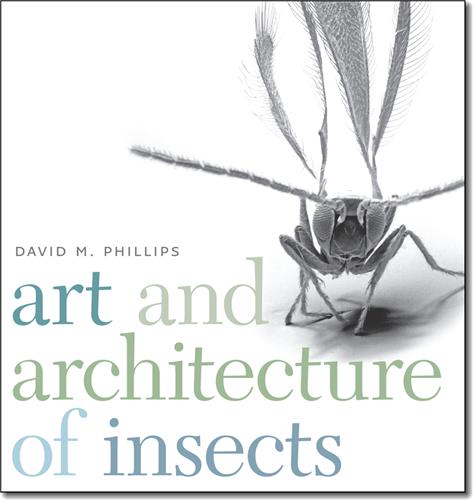Phillips’s delightful coffee-table volume reveals nature as architect in an ordered yet somehow whimsical world.
Clad in spiked and scaled armor, lance-like pincers at the ready, alien creatures are in our gardens, our floorboards, and our bedsheets. David M. Phillips has taken his life-long love of insect biology and microscopy and produced a mesmerizing look into the hidden world of the insect form. The 150 photographs in this book, all taken using an electron microscope, reveal an amazing variety of anatomical structures normally invisible to the human eye: a wax surface that prevents evaporation, antennae that sense molecules that are undetectable by other animals, and feet that allow insects to walk upside down on almost any surface. Organized with the nonscientific reader in mind, Art and Architecture of Insects explores the intricate structures of some of our planet’s most fascinating residents. This book’s stunning photography and entertaining facts will fill readers with a sense of wonder at the unseen universe that surrounds them. Whether young or old, jaded insect-lover or new to the awe-inspiring strangeness of insect exoskeletons, one thing is certain: You will never look at insects in the same way again.


“Phillips’s delightful coffee-table volume reveals nature as architect in an ordered yet somehow whimsical world.”
Publisher’s Weekly
Phillips’s delightful coffee-table volume reveals nature as architect in an ordered yet somehow whimsical world.
An eye-opening tour of the unseen marvels of insect form and design as revealed in finely sculptured detail and artistic beauty by the scanning electron microscope. . . . This book will make you really see living insects for the wonderful creatures they are.
A fascinating window on the variation in insect form, bolstered by an authoritative but appealingly nontechnical account of its relation to function that answers the question, How can flies walk upside down on the ceiling?
Written in a lively and accessible style, [this book] will appeal to entomologists and zoologists, as well as to students of biology and the general reader curious about the fascinating world of insects.
The book is a masterpiece; a rare combination of science, art, and humor. Some of the insects pose as though gesturing to us.
DAVID M. PHILLIPS was a biomedical researcher at the Population Council in New York City. He is now retired and living with his wife Robin and their pets in Barnstable, Mass. He has published over 200 papers in scientific journals. His microscopy photographs have appeared in hundreds of scholarly journals.

Founded in 1971, Brandeis University Press is a nonprofit publisher dedicated to publishing innovative, high-quality books for a general audience, as well as scholarship that advances knowledge and promotes dialogue in the humanities, arts, and social sciences around the world.
© Copyright 2024, Brandeis University Press
Brandeis University Press
Goldfarb Library 69-235, MS 046
Brandeis University
415 South Street
Waltham, MA 02453
(781) 736-4547
pressinfo@brandeis.edu

Stay up to date with the newest titles and promotions from Brandeis University Press—while saving 20% on your first purchase.